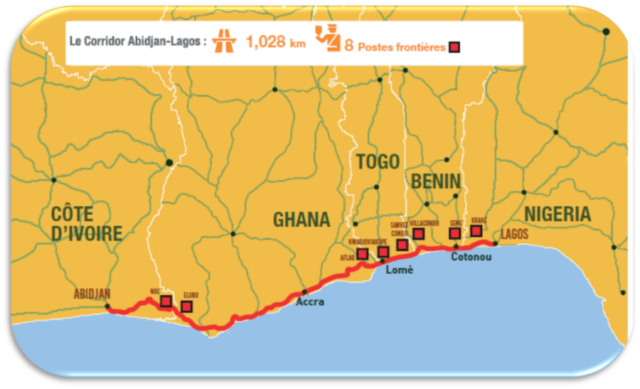…This 1,028-kilometre transnational coastal motorway will connect Côte d’Ivoire to Nigeria, while crossing through Ghana, Togo and Benin
WED NOV 27 2024-theGBJournal| The Abidjan-Lagos corridor highway will link the cities of five major West African countries by 2030, and is set to become a powerful economic and industrial hub courtesy of the Spatial Development Initiative promoted by the African Development Bank (AfDB).
This 1,028-kilometre transnational coastal motorway will connect Côte d’Ivoire to Nigeria, while crossing through Ghana, Togo and Benin. Work is due to commence in 2026 and is earmarked for completion in 2030, the African Development Bank revealed at an online workshop held on Thursday 22 November with all the partners associated with the project.
Under the African Development Bank’s leadership, feasibility studies, financing options for the motorway and institutional arrangements for getting the Abidjan-Lagos Corridor Management Authority up-and-running have already been overseen.
The Director of the Bank’s Infrastructure and Urban Development Department Mike Salawou said the transport corridor needs to become an economic corridor:
“This economic corridor approach also naturally overlaps with major urban development. It will support the growth of major economic hubs and improve links between large urban centres, secondary cities and rural areas within the five countries.
The Bank has launched the Spatial Development Initiative to enable transformative industrialisation right along the highway, to stimulate the growth of major economic clusters,”
In a report presented by the consultancy firm responsible for devising the Spatial Development Initiative, 206 specific interventions were identified that could initially require primarily private sector funding investments of around $6.8 billion. The spheres targeted for transformative investment include energy, renewable energy, manufacturing, transport and logistics, agriculture and agri-industry, ICT, tourism, mining and special economic zones.
The Director of Transport at the Economic Community of West African States (ECOWAS) Commission Chris Appoiah added, “Our ultimate objective is to ensure that the corridor and the economic activities to be developed along the corridor contribute to the ECOWAS regional integration agenda. It’s an integrated project which, once implemented, will help us to achieve the economic union we desire in our area.”
The toll-free motorway will boast four to six lanes, with up to eight lanes in Lagos. After a drive of 82 km through Nigeria, the road will cover 520 km in Ghana, 144 km in Cote d’Ivoire, 90 km in Togo, and 127 km in Benin. There are also plans to build 63 interchanges. Construction of the road is expected to generate up to 70,000 direct and indirect jobs. Most of the work will be carried out in the form of public-private partnerships,
The African Investment Forum, the largest investment platform in Africa championed by the African Development Bank and eight other partners, has been providing significant impetus to the project.
At the time of its “boardrooms” in 2021, $15.6 billion in potential investment had been pledged by various private and institutional actors for this emblematic project, which is one of ECOWAS’ key priorities.
Lydie Ehouman, the Chief Transport Economist and Project Manager at the African Development Bank presented the preparatory studies for the project. She said it would link an urban population which is expected to reach 173 million people by 2050 and connect the most densly populated metropolitian areas in West Africa the infrastructure will connect the most economically dynamic cities and the most densely populated metropolitan areas in West Africa from Abidjan, Takoradi and Accra, to Lomé, Cotonou, Porto-Novo and Lagos:
“The Abidjan-Lagos highway will connect up with the West African transport corridors (airport, road and rail) and will link the inland regions of Mali, Burkina Faso and Niger to all eight ports in the corridor, as well as to the Abidjan-Dakar-Praia corridor,” concluded Ehouman, who also served as moderator during the session.
The Bank was also represented at the gathering by Marco Yamaguchi, Head of Division in the Bank’s Infrastructure and Urban Development Department.
X-@theGBJournal|Facebook-the Government and Business Journal|email:gbj@govbusinessjournal.com|govandbusinessj@gmail.com










